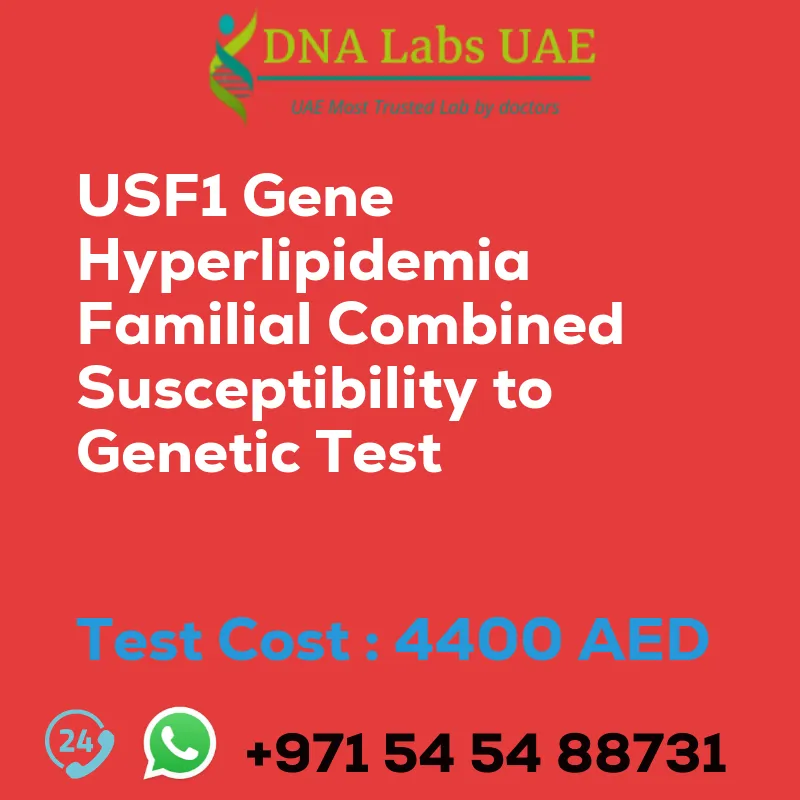USF1 Gene Hyperlipidemia Familial Combined Susceptibility to Genetic Test
At DNA Labs UAE, we offer the USF1 Gene Hyperlipidemia Familial Combined Susceptibility to Genetic Test for individuals who may be at risk for familial combined hyperlipidemia (FCHL). FCHL is a common genetic disorder characterized by elevated levels of cholesterol and triglycerides in the blood.
Test Details
The USF1 gene is associated with FCHL, and our NGS (Next-Generation Sequencing) technology allows us to analyze multiple genes simultaneously to identify genetic variations or mutations associated with this condition. By detecting variations in the USF1 gene, we can determine if an individual has a higher risk of developing FCHL.
Components and Price
The USF1 Gene Hyperlipidemia Familial Combined Susceptibility to Genetic Test is priced at 4400.0 AED. The test requires a blood sample or extracted DNA, or one drop of blood on an FTA card.
Report Delivery and Method
After the sample is collected, the report will be delivered within 3 to 4 weeks. Our NGS technology ensures accurate and reliable results.
Test Type and Doctor
The USF1 Gene Hyperlipidemia Familial Combined Susceptibility to Genetic Test falls under the category of Metabolic Disorders. Our team of qualified General Physicians specializes in genetic testing.
Test Department
Our Genetics department handles the USF1 Gene Hyperlipidemia Familial Combined Susceptibility to Genetic Test, ensuring that the test is performed and interpreted by professionals with expertise in this field.
Pre-Test Information
Prior to the test, it is important to provide the clinical history of the patient who is going for the USF1 Gene Hyperlipidemia Familial Combined Susceptibility to Genetic Test. Additionally, a Genetic Counselling session will be conducted to draw a pedigree chart of family members affected by Hyperlipidemia, familial combined, susceptibility to FCHL.
Benefits of Genetic Testing
Genetic testing can identify individuals with genetic susceptibility to FCHL, enabling healthcare professionals to provide personalized treatment and management strategies. By implementing preventive measures, the risk of cardiovascular complications associated with elevated lipid levels can be reduced. Furthermore, genetic testing can also be used for family screening and counseling to identify individuals who may be at risk for FCHL.
Who Should Consider Genetic Testing?
Genetic testing is typically recommended for individuals with a family history of FCHL or those who have significantly elevated lipid levels despite lifestyle modifications. It is important to consult with qualified healthcare professionals who can perform and interpret the test results and provide appropriate counseling and guidance based on the findings.
| Test Name | USF1 Gene Hyperlipidemia familial combined susceptibility to Genetic Test |
|---|---|
| Components | |
| Price | 4400.0 AED |
| Sample Condition | Blood or Extracted DNA or One drop Blood on FTA Card |
| Report Delivery | 3 to 4 Weeks |
| Method | NGS Technology |
| Test type | Metabolic Disorders |
| Doctor | General Physician |
| Test Department: | Genetics |
| Pre Test Information | Clinical History of Patient who is going for USF1 Gene Hyperlipidemia, familial combined, susceptibility to NGS Genetic DNA Test A Genetic Counselling session to draw a pedigree chart of family members affected with Hyperlipidemia, familial combined, susceptibility to |
| Test Details |
The USF1 gene is associated with familial combined hyperlipidemia (FCHL), which is a common genetic disorder characterized by elevated levels of cholesterol and triglycerides in the blood. FCHL is a complex disorder influenced by both genetic and environmental factors. NGS (Next-Generation Sequencing) genetic testing is a powerful tool used to analyze multiple genes simultaneously and identify genetic variations or mutations associated with a particular condition. In the case of FCHL, NGS genetic testing can detect variations in the USF1 gene that may increase the risk of developing the disorder. By identifying individuals with genetic susceptibility to FCHL through NGS genetic testing, healthcare professionals can provide personalized treatment and management strategies to reduce the risk of cardiovascular complications associated with elevated lipid levels. Additionally, genetic testing can also be used for family screening and counseling to identify individuals who may be at risk for FCHL and implement preventive measures. It’s important to note that genetic testing is typically recommended for individuals with a family history of FCHL or those who have significantly elevated lipid levels despite lifestyle modifications. Genetic testing should be performed and interpreted by qualified healthcare professionals who can provide appropriate counseling and guidance based on the test results. |








